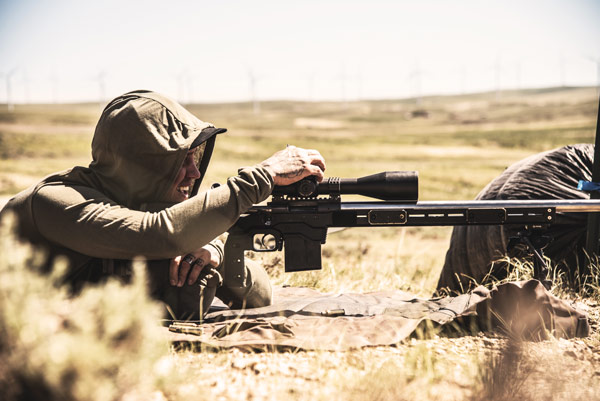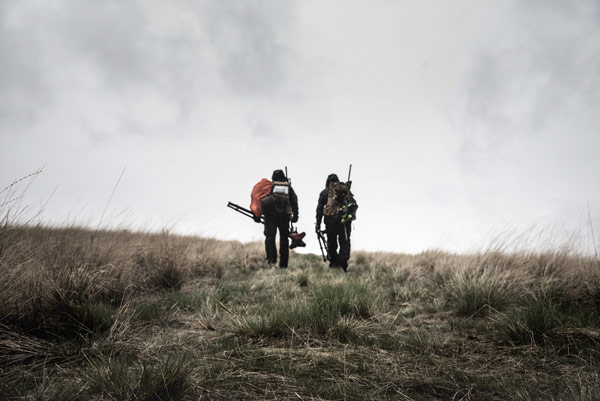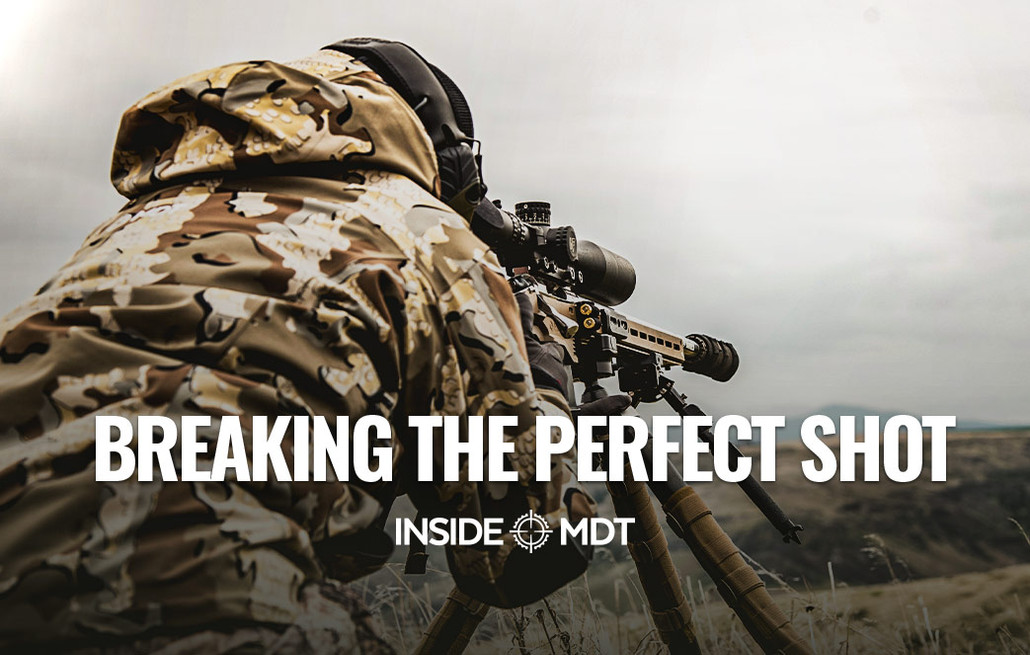Posted by Les Voth on 2023 Sep 21st
Breaking The Perfect Shot - Inside MDT
Only once has a competitor cleaned a two-day match, going for a perfect score. Who was the shooter? Austin Buschman, who did it at the Leupold Steel Classic PRS Match in Texas in January 2023. He hit all 176 targets over two days. In Cal Zant's fourth article on Austin Buschman, titled "PRS Strategy, Mental Management, & Shooting Tips with PRS Champ, Austin Buschman," Cal delves into the mental part of Austin's game. From this article, we can glean perspective from one of the top shooters in the country.
Perfection is hard. If you miss a target, there is something in your game that can be fixed. In the quest for a perfect run, your mind must see clearly what happened, not what you wished had been. Every aspect of the shot must be dissected. That clarity of criticism in search of a solution is paramount, but not at the cost of criticizing yourself. Self-criticism can be a good thing, but self-doubt breaks confidence.
It's common for a new shooter to miss 40-50 shots in a match. Much of that can be fixed with a clear analysis of each stage or position. That is, if the new shooter keeps enthusiasm and continues the adventure before progress can be made. Austin didn't enter the Leupold Steel Classic as a first-time competitor. Getting to that point took years of practice, experience, and FAILURE. He didn't walk away after his first match; instead, he returned for more. What is imperative for a shooter, no matter the experience level, is that you will have bad stages. What's important is to walk away with a short memory. Analyze what you did wrong and then move forward. Staying in the past and dwelling will only damage your psyche.

FIXING YOUR ISSUES
If your mental game is "on," you can fix Stage 3 on the way to Stage 4, ensuring that the wind call you missed on the last target gets collated into the next stage. As your game progresses, it becomes possible to see the mistakes, wrong calls, etc., as they occur in real time, allowing you to fix things inside a stage while on the clock. That's where repetition and practice come into play. When you've "assumed the position" a few thousand times between practice and matches, your gun/dope is reliable; as Austin says, "The rest is 100% mental."
For me, understanding the mental aspect comes from a life of experiences. I spent 35 years wandering around the continent in a loaded truck. I listened to folks talk/comment on their situations. I learned that many people are prone to blame everyone and anyone but themselves. When they'd describe their overreaction to someone else's action, I'd ask, "Who's foot was on the throttle of your vehicle?" "Well! They made me do it!" was the reoccurring response. So, the mythical "Other Guy" climbed into your skin, grabbed your wheel, and stomped on your throttle while wearing your boots? Come on!
Likewise, In shooting, you're the one behind the gun. There's no one else to blame, so you should take the lesson, look at it, find the solution, and advance. That's the beauty of the precision rifle game. It removes outside human influence. It is just the shooter, the rifle, and the stage. The only competition, at that moment, is yourself.
THINKING BACKWARDS TO MOVE FORWARD
Learning to "see backward" is a useful skill to develop. This means mentally reconstructing exactly what happened after the event. For example, have you ever lost your keys? These next questions usually follow—Where were you when you last had them in your hand? Where did you go when they were in your hand? Did you trip on the sidewalk before you "put" them in your pocket? If you want to drive your pickup again, you must think carefully about where you last parked, where you previously used your keys, and where you then put your keys. Unless you handed your keys to a buddy, it's your fault/responsibility to recover your keys. So, we learn to retrace our steps to solve the problem. We can recreate in our minds the paths we took and determine our points of failure from these.
Shooting is no different. No one is going to make you walk home if you throw a few points away, but you begged, borrowed, scraped, and sweated since you started this game to get on the line on Stage 7 of your first two-day match. As a shooter and competitor, you may as well make the best of the situation, but your "real" best, not a "Well, I'm here . . . I guess I better shoot, then," best, but a genuine effort. At the end of each stage, visualize the mistakes, problem solve, make the correction, and then move on. Forget the past; focus on the next shot and things you can control.

WHY BOTHER?
You never know who's watching. Seriously. Your kids may not become PRS competitors, but they see who and what you are. They see and recognize dedication when it appears out of the morning mist. Your kids will do nothing you say and everything you do.
Here's an example.
There's this guy I know, his name is Jack. Jack took a few swipes during his senior year of high school but walked away every time. Then, the reality of not finishing what he'd started bugged him, so he left his job every day, went to class, returned to his job, and eventually graduated.
The next year, another Jack, a year older than my buddy Jack, who'd been out of school since the end of his sophomore year, walked back into class with the intent of finishing high school. He could have written his GED and achieved the same result, but that wasn't his plan.
Two years later, while owning and operating a factory that manufactured technology competing with General Electric and Sylvania, Jack walked across the stage and received his high school diploma. That evening, the two graduates, Jack and Jack, happened to meet. The most recent graduate explained to the older, "I never told anyone, but I was watching you. If you hadn't finished, I never would've started!" The second Jack to graduate went on to be a lifelong student and achieved a doctorate in sociology by the time he hit 60. What if he'd never been inspired to begin and finish?
That begs the question: How do you want to be remembered? How do you want to remember yourself? You don't have to shoot PRS, F-Class, etc., but to learn to improve your performance while in action and learn to critique—exactly—what you've done, with an eye on constant improvement. It's teachable, learnable, and rewarding. Someone is watching you. They watch you struggle at the beginning. But then they notice the hard work you've put in. They've watched you practice and dissect stages. They see you ask other shooters questions to help better your own skill. They see that dedication and begin to admire and respect you. We all strive for perfection, but it's our failures in that struggle that build us.
Till next time. Les Voth.
COMPETITION RESOURCES FROM MDT
- A Journey of Practice
- Mastering the Mental Game of PRS
- Crimping Handloads
- PRS Production Division Rifle and Setup
- Dry Fire Drills with Pro Shooter Allison Zane
- Starting Over
- Practical Considerations of Competitive Shooting
- Keep Calm and Shoot On: How to Manage Stress
- Maximize Performance with Mental Imagery
- Practical Considerations Of Competitive Shooting
- A Shooter's Checklist - Delivering The Perfect Shot
- Beginners Gear Guide for Precision Rifle Competition
- Expert Gear Guide for Precision Rifle Competition
- How Professional Shooter Allison Zane Sets Up Her Rifle
- How To Shoot PRS: Stage Breakdown With PRS Top Lady
- Dry Fire Drills With Pro Shooter Allison Zane
- Confidence Kills
ABOUT THE AUTHOR
Les Voth was born in Canada and spent his youth hunting on his father's farm. In 1991, he settled in North Dakota and started a family. Les Started his long-range shooting journey in 2016 and has been active in the shooting scene as both an RO and a competitor.


 CAD
CAD
 Euro
Euro
